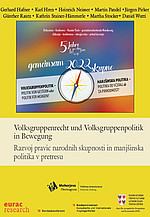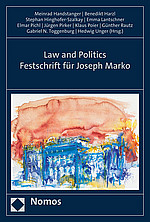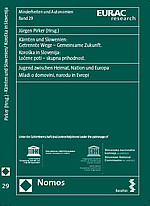Collective rights
Structural issues and developments in case law on the freedoms of association, nationality and religion in the Basic Law since 1848
Developments and functions of collective rights in Austria since 1848
This monograph examines the role of collective rights as an instrument for the accommodation of collective identities and the challenges they faced. Using the fundamental rights of assembly, nationality and religion, the work analyzes the development and functions of collective rights in Austria since 1848, examining the justification of these rights, the determination of collectives and their members, and the reconciliation of interests in cases of conflict.
The book develops a model of the gradual justification of collectives, ranging from objective-legal norms to collective rights that recognize collectives themselves as legal entities. The examination of case law reveals three central trends: collectivization, individualization and pluralization. The work highlights the functions and risks of collective rights and shows how identity politics influences the relationship between identity collectives and the state. It concludes by recommending flexible legal instruments to protect these collectives in a pluralistic society without forcing identity politics through the law.
Austrian publishing house, 2024, 564 pp.

History/ies in Conflict
The Consensus and Dialogue Process in Carinthia: From Ethnic Conflict towards a Peace Region Alps-Adria?
The Alps-Adriatic region is shaped by the violent Central European upheavals in the "age of extremes" (Hobsbawm). The Austrian province (Land) of Carinthia is a prototype of these developments. It is also considered a "special case" of Austrian contemporary history. The cause lies in a national conflict that shaped the history of the Land over more than 150 years. It still forms the basis for public discussions about minority rights. The most visible expression of this ethnic conflict was a decades-long dispute over bilingual topographical inscriptions. To resolve this dispute, the federal government initiates a “consensus process” to have a solution worked out by local conflict parties. Between some of the conflict actors, this process leads to a dialogue, which aims at a deeper analysis of the routes of the conflict. The book offers an analysis of these processes, their development, limits and potential, as well as central criticisms. It is dedicated to the interplay of history, collective identities and memories. The book discusses how dialogue initiatives use methods of conflict transformation to question exclusive narratives, to initiate dialogues among the population and to create an environment for new solutions in minority issues – heading towards the establishment of a "Peace Region Alps -Adria ".
Facultas, 2018, 376 p.
Content and Introduction:
Download: click here (German).
Reviews:
Petra Mayrhofer, Jürgen Pirker, Geschichte(n) im Konflikt. Der Konsens- und Dialogprozess in Kärnten: Vom nationalen Konflikt zur Friedensregion Alpen-Adria? Wien 2018, 376 Seiten, Zeitgeschichte 4/2019, 566-568.

Minority Protection and Language Promotion
Lessons from bilingual Carinthia and trilingual South Tyrol. Perspectives for the Austrian Laws on Ethnic Groups
The book identifies current challenges of minority protection in Austria (Carinthia). It provides a model for its improvement by combining “classic” elements of minority protection with a wider protection of language and language promotion. The implementation of this approach and its functions are analyzed within the legal framework in Austria (Carinthia). Findings of the book build on historical comparison and sociological analyses of minority situations in Carinthia (Austria) and South Tyrol (Italy), which is often prescribed as a “model of success”. Thereby, the book outlines perspectives for ongoing discussions about necessary reforms of the Austrian system of minority protection.
Böhlau, 2017, 385 p. German.
Reviews:
Günther Rautz, Jürgen Pirker: Minderheitenschutz und Sprachförderung, JRP 2018/2, 154-155 (German).
Komáromi Sándor, Pirker, Jürgen: Law and Symbolism. The Inclusion of the Carinthian Slovene Minorityin the Province’s Constitution, in: KISEBBSÉGKUTATÁS/MINORITY STUDIES, 4/2017, 134-137 (Hungarian).
Schneider-Mizony O., Pirker Jürgen. Minderheitenschutz und Sprachförderung Pluralismustauglicher Minderheitenschutz am Beispiel des zweisprachigen Kärnten und dreisprachigen Südtirol, 2017, Nouveaux Cahiers d'Allemand : Revue de linguistique et de didactique, Vol.36, n°2, 2018, 201-204 (Fench).
Book Announcement and Interview:
Die Presse, Peace Education for Carinthia, 18.08.2017 (German).
Content:
Look inside the book (German).

We are Carinthia: Youth, Contact and Political Education in Minority Issues
We are Carinthia: Youth, Contact and Political Education in Minority Issues
The book gives voice to young people and deals with their attitudes towards “conflictive” past and its interpretation, minority protection and Europe. It uses outcomes of a survey among more than 1,500 pupils (15 to 17) years in all grammar schools in Carinthia and builds upon an interactive dialogue project. The results indicate: Personal contact, a deeper exploration of the history of the region and his own family history, better information in minority affairs and an understanding of the other person’s perspective prepare and foster the way for a common future – in a common Europe.
Verlag Nomos, 2013, 157 p. German.
Review:
Ines Weber, Jürgen Pirker: Wir sind Kärnten – Mi smo Koroška, in: Portal für Politikwissenschaft, 2013 (German).
Content:
Download: click here (German).
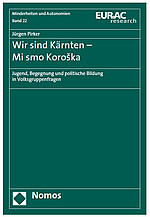
Carinthian Town Sign Issue - The Law Conflict as Identity Conflict
Carinthian Town Sign Issue - The Law Conflict as Identity Conflict
The book deals with the discussion about minority rights in the Austrian Land Carinthia. Building on the history of the majority-minority conflict in the 19th and 20th Century, it argues that the dispute about bilingual topography and the legal provisions in question has to be unterstood as identity conflict.
Nomos, 2010, 338 p. German and English (Summary: 60 p.)
Review:
Tamara Ehs, Jürgen Pirker: Kärntner Ortstafelstreit, in: Portal für Politikwissenschaft, 2010 (German).

Minority Rights and Minority Politics on the Move
German and Slovenian
Minority Rights and Minority Politics on the Move
German and Slovenian
Eds: Gerhard Hafner / Karl Hren / Heinrich Neisser/ Martin Pandel / Jürgen Pirker / Günther Rautz / Kathrin Stainer-Hämmerle / Martha Stocker / Daniel Wutti
The book offers a reflection on the current system of minority rights and minority protection - not as a relic of yesterday, but as an instrument for the coexistence of tomorrow. The contributions are devoted to the current situation of the ethnic groups, the needs and identities of their members, the political representation of the ethnic groups, bilingual education and the further development of minority rights. Specifically, the empirical results of a study on the current state of bilingualism in Carinthia, which was commissioned by the Federal Chancellery in spring 2022, are summarised. A look at other minority situations, such as those in South Tyrol and in the German-Danish border region, or the European perspective with the reporting system of the Council of Europe's Framework Convention for the Protection of National Minorities and the "Minority SafePack" as a European citizens' initiative round off the informative contributions with different scientific and socio-political approaches and are intended to be the starting point for a constructive and solution-oriented dialogue.
Chapters by: Katharina Brunner, Georg Gombos, Valentin Inzko, Gerhard Jandl, Karolina Mirjam Januszewski, Peter Jordan, Peter Kaiser, Arno Kompatscher, Emma Lantschner, Stefan Oeter, Bernard Sadovnik, Jana Trap, Dejan Valentinčič, Loránt Vincze, Rudi Vouk, Anna Wolf, Daniel Wutti.
Hermagoras Verlag, Klagenfurt/Ljubljana/Wien, 2023, 466 pages.
All contributions and further presentations of the underlying conference of October 2022 can be found here in German and Slovenian.
Law and Politics
Festschrift für Joseph Marko (German and Englisch)
Eds: Meinrad Handstanger | Benedikt Harzl | Stephan Hinghofer-Szalkay | Emma Lantschner | Elmar Pichl | Jürgen Pirker | Klaus Poier | Günther Rautz | Gabriel Toggenburg | Hewdig Unger
This volume pays tribute to the work and achievements of Joseph Marko as an outstanding mind, scholar and exceptional scientist through more than 50 contributions by friends and colleagues from research and practice. The authors address topics of constitutional law and political science, international law, and comparative law, especially with regard to questions of human rights and the protection of minorities - all areas that the jubilarian dealt with in his academic career in a living interdisciplinarity and internationality, and which he continues to explore with an untiring quest for knowledge.
Chapters by: Werner Andrä | Mikhail Antonov | Christoph Bezemek | Florian Bieber | Drino Galicic | Andrea Carlà | Sergiu Constantin | Claudio Corradetti | Alice Engl | Reinhold Esterbauer | Estelle Evrard | Anna Gamper | Daniela Grabovac | Christoph Grabenwarter | Georg Grote | Arben Hajrullahu | Meinrad Handstanger | Benedikt Harzl | Stephan Hinghofer-Szalkay | Rainer Hofmann | Christoph Hofstätter | Zoran Ilievski | Sara Intering | Gerhard Jandl | Michael Karnitschnig | Michael Keating | Marko Kmezić | Karl Kössler | Josip Kregar † | Maximilian Lakitsch | Emma Lantschner | Thomas Leitner | Leonidas Makris | Roberta Medda-Windischer | Aistė Mickonytė | Johanna Mitterhofer | Francesco Palermo | Marianne Pasterk | Antonija Petričušić | Wolfgang Petritsch | Elmar Pichl | Jürgen Pirker | Klaus Poier | Patricia Popelier | Günther Rautz | Levente Salat | Sia Spiliopoulou Åkermark | Karl Stöger | Stefan Storr | Gabriel N. Toggenburg | Alexandra Tomaselli | Roberto Toniatti | Philipp Trappl | Hedwig Unger | Wolfgang Weirer | Bernd Wieser | Robert F. Williams | Verena Wisthaler | Jens Woelk | Kerstin Wonisch | Heribert Wulz | Anita Ziegerhofer.
Nomos, Baden-Baden, 2022, 1188 pages.
Problems and Perspectives of Minority Protection. 100 Years after the Carinthian Plebiscite
Series: skupno gemeinsam together 2020
Problems and Perspectives of Minority Protection. 100 Years after the Carinthian Plebiscite
Series: skupno gemeinsam together 2020
Eds: Gerhard Hafner / Karl Hren / Heinrich Neisser/ Martin Pandel / Jürgen Pirker / Günther Rautz / Kathrin Stainer-Hämmerle
100 years after the referendum in Carinthia, the book looks back into the past and the future: Based on the legacy of the peace order of 1919/20, it deals with the history of minority policy in the 20th century and examines problems and possibilities for the development of minority protection in the 21st century. Articles are devoted to dealing with the past and conflict history(ies), illustrate successful instruments of language preservation, language planning or effective teaching models in European regions, analyze the consequences of Europeanization, urbanization and digitization for minorities, and shed light on diversity among their young members as well as the role of the diaspora for minorities and regional identities. In view of the dangers and opportunities of these factors, the question of new instruments for effective minority protection and language preservation arises 100 years after the reorganization of Europe and the establishment of the first international minority protection system. The collected contributions open up perspectives for their development - in Austria, the Alps-Adriatic region and Europe.
With contributions from:
Georg Grote, Gerhard Hafner, Elin Haf Jones, Nadia Kalb, Helmut Konrad, Milan Obid, Jürgen Pirker, Hans-Karl Peterlini, Andrej Rahten, Ilse Reiter-Zatloukal, Martha Stocker, Helmut Tichy, Hanzi Tomažič, Fernand de Varennes, Loránt Vincze, Miha Vrbinc, Marija Wakounig, Samo Wakounig, Vladimir Wakounig, Colin Williams, Lamberto Zannier, Jernej Zupančič, Deva Zwitter.
Comments and Statemens from:
Daniel Alfraider, Peter Česnik, Valentin Inzko, Peter Kaiser, Robert Klinglmaier, Lena Kolter, Simon Kummer, Heinrich Neisser, Ema Pregelj, Igor Pucker, Alenka Smerkolj, Rudi Vouk, Kathrin Stainer-Hämmerle, Martha Stocker, Daniela Topar, Olga Voglauer.
Forewords:
Minister Susanne Raab, State Secretary Dejan Valentinčič, Ambassador Ksenija Škrilec, Ambassador Sigrid Berka, President of the Carinthian Parliament Reinhart Rohr, Superintendent Manfred Sauer, Bischop Jože Marketz.
Hermagoras Verlag, 2020, 500 p.
DVD: Documentation and Recording of the conference "The Future of the Slovenes in Carinthia" in July 2020.
Book - Content and Introducion:
Click here to download (German/Slovenian).
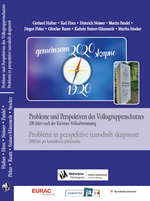
Borders - Separation and Connection 1918-2018
Series: gemeinsam/skupno 2020
Borders - Separation and Connection 1918-2018
Series: gemeinsam/skupno 2020
Eds: Gerhard Hafner / Karl Hren / Heinrich Neisser/ Martin Pandel / Jürgen Pirker / Günther Rautz / Kathrin Stainer-Hämmerle
Borders separate and connect, politically and mentally. The borders drawn after the First World War created new nation states and promoted nationalism, which experienced its most aggressive forms in the 20th century. The borders drawn 100 years ago still lead to tensions and conflicts today. After the Second World War, the European Community set out as a "peace project" to overcome borders that had recently been closed again in response to the migration and refugee crisis - in reality and in people's minds. The 100th anniversary of the reorganisation of Europe after the First World War, the foundation of the First Republic and the Carinthian referendum provide an opportunity to examine from an interdisciplinary perspective the causes and consequences of border demarcations, their overcoming and the potential of border areas in the European Union. In the present volume, family histories illustrate the subjective experiences of border residents and members of minorities who had to leave their "homeland" after the redrawing of borders 100 years ago. These impressions are followed by analyses of the genesis of these border demarcations and their consequences for the present. The contributions shed light on the functions of borders and how they can be overcome by the European Union.
Contributions:
Ernst Bruckmüller (Wien), Claudia Fräss-Ehrfeld (Klagenfurt), Danijel Grafenauer (Ljubljana), Roland Girtler (Wien), Tamara Griesser-Pecar (Wien), Gerhard Hafner (Wien), Othmar Karas (Wien/EP), Heinrich Neisser (Wien/Innsbruck), Jürgen Pirker (Graz), Manfried Rauchensteiner (Wien)
Preface:
Dr. Peter Kaiser, Governor of Carinthia
Hermagoras Verlag, 2019, 232 p.
Content and Introducion:
Download: click here (German).
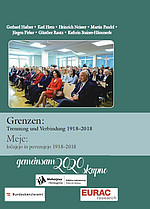
Old and New Minorities: Integration, Law and Politics
Series: gemeinsam/skupno 2020
Old and New Minorities: Integration, Law and Politics
Series: gemeinsam/skupno 2020
Eds: Gerhard Hafner / Karl Hren / Heinrich Neisser/ Martin Pandel / Jürgen Pirker / Günther Rautz / Kathrin Stainer-Hämmerle
Migration challenges the classical protection of minorities at the beginning of the 21st century. A sustainable handling of "new" and "old" diversity requires an analysis of the separation between autochthonous and other minorities in proven minority protection concepts and their consequences for different groups and their members. The book therefore raises the following questions: Are protection systems for old minorities still effective? Do the criteria underlying the demarcation between new and old minorities continue to make sense? To what extent do "classical" systems of protection of ethnic minorities respond to the increasing presence of new groups? To answer these questions, the volume integrates perspectives from the historical, legal, political and social sciences - using Austria as an example in its international context.
Contributions:
Doris Angst (Bern), Wolfgang Benedek (Graz), Marika Gruber (Klagenfurt), Gerhard Hafner (Wien), Nadine Hell (Klagenfurt), Stephan Leitner (Wien), Joseph Marko (Graz), Jürgen Pirker (Graz), Günther Rautz (Bozen), Albert Reiterer (Wien), Kathrin Stainer-Hämmerle (Klagenfurt), Gabriel Toggenburg (Wien/Bozen), Dejan Valentincic (Ljubljana), Vladimir Wakounig (Klagenfurt)
Foreword:
Dr. Peter Kaiser, Governor of Carinthia
Hermagoras Verlag, 2018, 294 p.
Content and Introduction:
Download: click here (German/Slovenian).
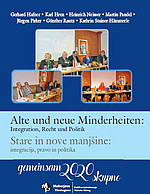
Carinthia and Slovenia: Common Ways - Separate Future
Carinthia and Slovenia: Common Ways - Separate Future
Youth between Homeland, Nation and Europe
Within the Alps-Adriatic Region nationalism in its most aggressive forms has cut deep wounds into the memory of people, belonging to different nations and national minorities. Building on an action-research based initiative, the book analyzes attitudes of more that 5,000 pupils in Carinthia and Slovenia towards neighboring countries and languages, nationalism and the European Union, old and new minorities in Europe and the relations of Carinthia and Slovenia. Several Articles deal with the history of conflicts between the two countries, highlight related identity concept and explain the functions of language in border regions. The underlying initiative can be seen as contribution to peace research and peace education in Central Europe – fostering mutual understanding by dealing with the past.
Contributions by:
Danijel Grafenauer | Linda Hofmeister | Helmut Konrad | Sonja Novak-Lukanovič | Joseph Marko | Rainer Pichler | Jürgen Pirker | Stefanie Vavti | Hellwig Valentin | Werner Wintersteiner | Daniel Wutti
Nomos, 2015, 344 p. German and Slovenian.
Review of the initiative:
Nadja Danglmaier, Andreas Hudelist und Daniel Wutti, Good Practice Herausragende Schulprojekte zum Thema Nationalsozialismus, in: Nadja Danglmaier/Andreas Hudelist/Samo Wakounig/Daniel Wutti (Hrsg.), Erinnerungsgemeinschaften in Kärnten/Koroška, Hermagoras, 2017, 231 (German).
Content:
Download: click here (German/Slovenian).
L' état, c'est quoi? State Authority in Transition
L' état, c'est quoi? State Authority in Transition
Eds: Heschl / Juri / Neubauer / Pirker / Scharfe / Wagner / Willgruber
Articles by:
Helmut Philipp Aust (Berlin), Maria Bertel (Innsbruck), Dominik Elser (Bern), Jasper Finke (Hamburg), Rike U. Krämer (London), Malte Kröger (Hamburg), Elmar Krüger (Osnabrück), Claudia Wutscher (Wien), Anna Mrozek (Leipzig), Hannes Rathke (Berlin/Heidelberg), Philipp Reimer (Freiburg), Vanessa Rüegger (Basel), Roya Sangi (Hamburg) und Dominik Steiger (Berlin).
Nomos, 2015, 329 p. German.
Review:
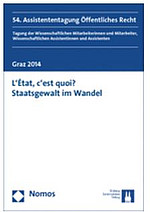
Contributions (selection, available online)
Collective rights. Identity collectives in the field of tension between law and politics (since 1848), JRP 3/2021, 175-186.
Educational Power and State Power: Autonomy or Intervention, in: Graz Law Working Papers 15/2021, 1-17.
Memory Wars and Minority Rights: From Ethnic Conflict towards a Peace Region Alps-Adriatic?, in: treatises and documents 86/2021, 5-32.
Democracy in the health crisis: The limits of freedom of assembly, in: CuRe 4/2021, Manz, Vienna, online.
Failure of the constitutionin: Voigt, Rüdiger (ed.), Departure to Democracy. The Weimar Constitution as a blueprint for a democratic republic, Nomos, Baden-Baden, 2020, pp. 859-884.
Minority rights, in: Voigt, Rüdiger (ed.), Towards Democracy. The Weimar Constitution as a blueprint for a democratic republic, Nomos, Baden-Baden, 2020, pp. 243-256.
Tobacco law, in: Holoubek, Michael/Potacs, Michael (eds.), Öffentliches Wirtschaftsrecht. Volume 2, 4th edition, Verlag Österreich, Vienna, 2019, pp. 931-970.
Law and symbolism. The new constitution of the province of Carinthia on ethnic group issues, in: Europa Ethnica, 1-2/2017, Vienna, pp. 2-8.
Steiermärkische Gemeindestrukturreform 2015. Procedure and legal implementation of the largest territorial reform in Styria since 1945, review essay, in: ZfV 3/2017, Vienna, pp. 392-397.
Five years of the "Ortstafel regulation", 40 years of the National Minorities Act: Review and perspectives for the law on the national minorities, in: Europa Ethnica, 3-4/2016, Vienna, pp. 60-67.
Other competences of the Administrative Court pursuant to Art 133 para 2 B-VGin: Holoubek, Michael/Lang, Michael (eds.), Das Verfahren vor dem Verwaltungsgerichtshof, Linde Verlag, Vienna, 2015, pp. 293-310.
Stability and sustainability through (constitutional) law? Examples from the law on ethnic groupsin: Breitenlechner, Josefa/Kalteis, Michael/Kolar, Julia/Kristoferitsch, Gisela/Lukan, Matthias/Manolas, Emmanuel/Rogatsch, Yvonne/Tobisch, Kerstin (eds.), Securing Stability through Law. Conference of Austrian Public Law Assistants. Volume 5, Jan Sramek Verlag, Vienna, 2015, pp. 161-178.
One Step Forward, Two Steps Back? Reflections on the Recent Attempts to Reform the Austrian National Minorities Act of 1976in: Åkermark, Sia/ Bloed, Arie/ Hofmann, Rainer/ Marko, Joseph/ Mayall, James/Packer, John/Weller, Marc (eds.), European Yearbook of Minority Issues, Volume 12 (2013), Brill | Nijhoff, Leiden, 2015, pp. 339-352.
Future through the past? Interactive conflict transformation and politics of remembrance using the example of the Alps-Adriatic regionin: Wintersteiner, Werner/Wolf, Lisa (eds.): Peace Research in Austria. Bilanz und Perspektiven, Drava, Klagenfurt, 2016, pp. 264-278. with Jan Brousek.
"I see people and judge them according to their personality, not their culture." - Reflections of young people on Carinthia and Slovenia - between homeland, nation and Europein: Anderwald, Karl/Filzmaier, Peter/Hren, Karl (eds.), Kärntner Jahrbuch für Politik 2015, Hermagoras, Klagenfurt/Vienna, 2015, pp. 268-284. With Linda Hofmeister.
Visions for Carinthia: "Neue Wege 2020/Nove poti 2020" - Results of an initiative on understanding and political educationin: Anderwald, Karl/Filzmaier, Peter/Hren, Karl (eds.), Kärntner Jahrbuch für Politik 2014, Hermagoras, Vienna/Klagenfurt/Ljubljana, pp. 131-148.
Shadows of the past in South Tyrol and Carinthia: History(s) as a resource for conflict in the jubilee years 2014/15in: Stainer-Hämmerle, Kathrin/Plaikner, Peter (eds.), Tyrolean Yearbook of Politics 2010-2013, 2014, pp. 183-195.
Minorities between law and politics - the example of the Carinthian place name dispute. Notes on the mutual enrichment of legal and political sciencein: Hauser, Werner/Thomasser, Andreas (eds.), Bildung, Wissenschaft, Politik. Instruments for Shaping Society, Böhlau, Vienna/Cologne/Graz, 2014, pp. 618-635.
Crossing Borders - Facing Diversity: Trans-national Youth Initiatives within and between Carinthia and Slovenia, in: Gruber, Bettina/Wintersteiner, Werner (eds.), Learning Peace - an integrative Part of Peace Building, Drava, Klagenfurt, 2014, pp. 331-344.
Ending a Never-Ending-Story: The Solution of the Conflict on Bilingual Topography in Austria - Analysis, Open Questions and Perspectivesin: Åkermark, Sia/Bloed, Arie/Hofmann, Rainer/Marko, Joseph/Mayall, James/Packer, John/Weller, Marc (eds.), European Yearbook of Minority Issues, Volume 11 (2012), Brill | Nijhoff, Leiden, 2014, pp. 345-357.
Aged by law? The "ages of live" in Austrian lawin: Krieberbegg, Ulla/Maierhofer, Roberta (eds.), Aging Studies in Europe. Vol. 3: The Ages of Life - Living and Aging in Conflict?, Transcript, Bielefeld, 2013, pp. 71-86. with Nora Melzer-Azodanloo. [This text is posted here by permission of transcript Verlag for personal use only, not for redistribution].
Reform of ethnic group law. Die Lösung der Ortstafelfrage 2011, in: ÖJZ 9/2012, Vienna, 2012, pp. 396-405.
On the (self-)meaning of history(ies). Large and small narratives in Carinthiain: Petritsch, Wolfgang/Graf, Wilfried/Kramer, Gudrun (ed.), Kärnten liegt am Meer. Conflict stories about trauma, power and identity, Verlag Johannes Heyn, Klagenfurt, 2012, pp. 448-465.
How to Stop a Perpetuum Mobile? Interdisciplinary Insights into the Ongoing Issue of the Slovene Ethnic Minority in Austria: The Question of Bilingual Topographyin: Åkermark, Sia/Bloed, Arie/Hofmann, Rainer/Marko, Joseph/Mayall, James/Packer, John/Weller, Marc (eds.), European Yearbook of Minority Issues, Volume 8 (2010), Brill | Nijhoff, Leiden, 2012, pp. 717-748.
The "Turning Point" at Austrian Universities. Upheavals, innovations and consequences of the UOG 1993in: Schübl, Elmar/Heppner, Harald (eds.), Universities in times of upheaval. Case Studies on Central and Eastern Europe in the 20th Century, LIT Verlag, Vienna, 2011, pp.107-120 [with the kind permission of Lit Verlag; the book is available for € 24,90,-].
Styrian childcare lawin: Poier, Klaus/Wieser, Bernd (eds.), Steiermärkisches Landesrecht. Volume 3: Special Administrative Law, Springer, Vienna, 2011, pp.73-100. With Peter Ivankovics.
Across the "middle of the bridge" - The path to resolving the Carinthian place name sign issue 2010-2011in: Anderwald, Karl/Filzmeier, Peter/Hren, Karl (eds.), Kärntner Jahrbuch für Politik 2011, Hermagoras-Mohorjeva, Klagenfurt, 2011, pp. 78-107.
When the owl of Minerva begins its flight... On the current situation of the organizations of the national minoritiesin: Anderwald, Karl/Filzmeier, Peter/Hren, Karl (eds.), Kärntner Jahrbuch für Politik 2010, Hermagoras-Mohorjeva, Klagenfurt, 2010, pp.111-128.
